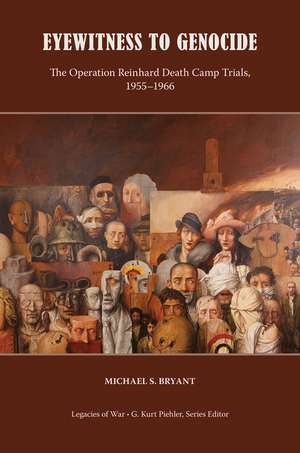Eyewitness to Genocide: The Operation Reinhard Death Camp Trials, 1955-1966: Legacies of War
Autor Michael Bryanten Limba Engleză Paperback – 26 aug 2016
Winner of the Book of the Year Award from the American National Chapter of the Association Internationale de Droit Penal.
One of the deadliest phases of the Holocaust, the Nazi regime’s “Operation Reinhard” produced three major death camps—Belzec, Treblinka, and Sobibor—which claimed the lives of 1.8 million Jews. In the 1960s, a small measure of justice came for those victims when a score of defendants who had been officers and guards at the camps were convicted of war crimes in West German courts. The conviction rates varied, however. While all but one of fourteen Treblinka defendants were convicted, half of the twelve Sobibor defendants escaped punishment, and only one of eight Belzec defendants was convicted. Also, despite the enormity of the crimes, the sentences were light in many cases, amounting to only a few years in prison.
In this meticulous history of the Operation Reinhard trials, Michael S. Bryant examines a disturbing question: Did compromised jurists engineer acquittals or lenient punishments for proven killers? Drawing on rarely studied archival sources, Bryant concludes that the trial judges acted in good faith within the bounds of West German law. The key to successful prosecutions was eyewitness testimony. At Belzec, the near-total efficiency of the Nazi death machine meant that only one survivor could be found to testify. At Treblinka and Sobibor, however, prisoner revolts had resulted in a number of survivors who could give firsthand accounts of specific atrocities and identify participants. The courts, Bryant finds, treated these witnesses with respect and even made allowances for conflicting testimony. And when handing down sentences, the judges acted in accordance with strict legal definitions of perpetration, complicity, and action under duress.
Yet, despite these findings, Bryant also shows that West German legal culture was hardly blameless during the postwar era. Though ready to convict the mostly working-class personnel of the death camps, the Federal Republic followed policies that insulated the judicial elite from accountability for its own role in the Final Solution. While trial records show that the “bias” of West German jurists was neither direct nor personal, the structure of the system ensured that lawyers and judges themselves avoided judgment.
Michael S. Bryant is professor of history and legal studies at Bryant University. He is the author of Confronting the “Good Death”: Nazi Euthanasia on Trial, 1945–1953, A World History of War Crimes, and Nazi Crimes and Their Punishment. Bryant specializes in the impact of the Holocaust on the law, human rights, German criminal law, and international humanitiarian law.
One of the deadliest phases of the Holocaust, the Nazi regime’s “Operation Reinhard” produced three major death camps—Belzec, Treblinka, and Sobibor—which claimed the lives of 1.8 million Jews. In the 1960s, a small measure of justice came for those victims when a score of defendants who had been officers and guards at the camps were convicted of war crimes in West German courts. The conviction rates varied, however. While all but one of fourteen Treblinka defendants were convicted, half of the twelve Sobibor defendants escaped punishment, and only one of eight Belzec defendants was convicted. Also, despite the enormity of the crimes, the sentences were light in many cases, amounting to only a few years in prison.
In this meticulous history of the Operation Reinhard trials, Michael S. Bryant examines a disturbing question: Did compromised jurists engineer acquittals or lenient punishments for proven killers? Drawing on rarely studied archival sources, Bryant concludes that the trial judges acted in good faith within the bounds of West German law. The key to successful prosecutions was eyewitness testimony. At Belzec, the near-total efficiency of the Nazi death machine meant that only one survivor could be found to testify. At Treblinka and Sobibor, however, prisoner revolts had resulted in a number of survivors who could give firsthand accounts of specific atrocities and identify participants. The courts, Bryant finds, treated these witnesses with respect and even made allowances for conflicting testimony. And when handing down sentences, the judges acted in accordance with strict legal definitions of perpetration, complicity, and action under duress.
Yet, despite these findings, Bryant also shows that West German legal culture was hardly blameless during the postwar era. Though ready to convict the mostly working-class personnel of the death camps, the Federal Republic followed policies that insulated the judicial elite from accountability for its own role in the Final Solution. While trial records show that the “bias” of West German jurists was neither direct nor personal, the structure of the system ensured that lawyers and judges themselves avoided judgment.
Michael S. Bryant is professor of history and legal studies at Bryant University. He is the author of Confronting the “Good Death”: Nazi Euthanasia on Trial, 1945–1953, A World History of War Crimes, and Nazi Crimes and Their Punishment. Bryant specializes in the impact of the Holocaust on the law, human rights, German criminal law, and international humanitiarian law.
Din seria Legacies of War
-
 Preț: 352.42 lei
Preț: 352.42 lei -
 Preț: 362.01 lei
Preț: 362.01 lei -
 Preț: 461.77 lei
Preț: 461.77 lei -
 Preț: 458.18 lei
Preț: 458.18 lei -
 Preț: 261.73 lei
Preț: 261.73 lei -
 Preț: 227.20 lei
Preț: 227.20 lei -
 Preț: 133.80 lei
Preț: 133.80 lei -
 Preț: 207.20 lei
Preț: 207.20 lei -
 Preț: 407.07 lei
Preț: 407.07 lei -
 Preț: 220.67 lei
Preț: 220.67 lei -
 Preț: 176.68 lei
Preț: 176.68 lei -
 Preț: 490.52 lei
Preț: 490.52 lei -
 Preț: 251.36 lei
Preț: 251.36 lei -
 Preț: 260.97 lei
Preț: 260.97 lei - 15%
 Preț: 398.20 lei
Preț: 398.20 lei
Preț: 197.26 lei
Nou
Puncte Express: 296
Preț estimativ în valută:
37.74€ • 39.41$ • 31.17£
37.74€ • 39.41$ • 31.17£
Carte tipărită la comandă
Livrare economică 15-29 aprilie
Preluare comenzi: 021 569.72.76
Specificații
ISBN-13: 9781621902621
ISBN-10: 1621902625
Pagini: 326
Dimensiuni: 152 x 229 x 20 mm
Greutate: 0.43 kg
Editura: University of Tennessee Press
Colecția Univ Tennessee Press
Seria Legacies of War
ISBN-10: 1621902625
Pagini: 326
Dimensiuni: 152 x 229 x 20 mm
Greutate: 0.43 kg
Editura: University of Tennessee Press
Colecția Univ Tennessee Press
Seria Legacies of War
Notă biografică
Michael S. Bryant is professor of history and legal studies at Bryant University. He is the author of Confronting the “Good Death”: Nazi Euthanasia on Trial, 1945–1953, A World History of War Crimes, and Nazi Crimes and Their Punishment. Bryant specializes in the impact of the Holocaust on the law, human rights, German criminal law, and international humanitiarian law.
Recenzii
“This is a superb book that promises to make a major intervention in a crowded field. Bryant promises to bring together two rather distinct strands of analysis in the literature: the political and the legal. To a greater extent than any volume I’m aware of, Bryant brings these two strands together in a coherent and cogent way.”
—Devin Pendas, author of The Frankfurt Auschwitz Trial, 1963–1965: Genocide, History, and the Limits of the Law
—Devin Pendas, author of The Frankfurt Auschwitz Trial, 1963–1965: Genocide, History, and the Limits of the Law








